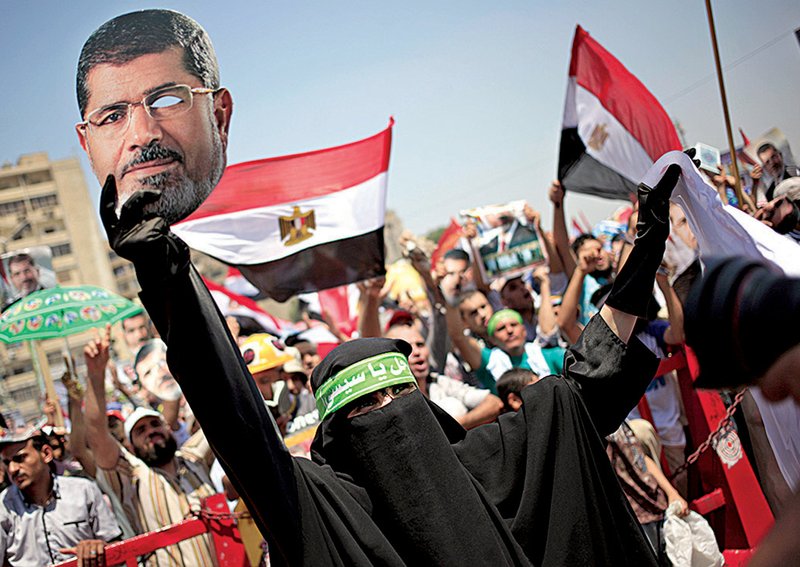CAIRO - Prosecutors opened an investigation of ousted President Mohammed Morsi on charges including murder and conspiracy with the Palestinian militant group Hamas, fueling tensions amid a showdown in the streets between backers of the military and supporters calling for the Islamist leader’s reinstatement.
The demonstrations in Cairo were mostly peaceful into the evening. But by late Friday night in Cairo, police fired tear gas to disperse hundreds of Morsi supporters near a sit-in they have held for weeks, setting off clashes that lasted into early this morning - in a possible sign of a new intolerance for marches that block city streets. A field-hospital doctor said seven protesters were killed and hundreds injured.
In the city of Alexandria, seven people were killed and more than 100 were injured in clashes between supporters and opponents of Morsi, officials said.
Skirmishes also broke out in the Mediterranean coastal cities of Damietta and Mahalla, in the southern city of Luxor, and a Cairo neighborhood that left 64 injured, Health Ministry spokesman Khaled el-Khateeb and local security officials said.
The announcement of the investigation against Morsi, which is likely to pave the way for a formal indictment, was the first word on his legal status since the military deposed him July 3. For more than three weeks, the Islamist leader has been held by the military incommunicado in a secret location.
Supporters of Morsi denied the charges against him, calling them politically motivated, but vowed to keep their protests peaceful.
On Friday, a spokesman for Morsi’s Muslim Brotherhood said the move to prosecute Morsi showed “the complete bankruptcy of the leaders of the bloody coup.”
Egyptians “reject the return of the dictatorial police state and all the repression, tyranny and theft it entails,” Ahmed Aref said in a statement.
The accusations are connected to a prison break during the 2011 uprising against autocrat Hosni Mubarak in which gunmen attacked a prison northwest of Cairo, freeing prisoners including Morsi and about 30 other figures from his Muslim Brotherhood. The prosecutors allege Morsi and the Brotherhood worked with Hamas to carry out the break, in which 14 guards were killed.
U.S. State Department spokesman Jen Psaki expressed concern about reports of Morsi’s detention.
“I can’t speak to the specific charges. But we do believe that it is important that there be a process to work toward his release,” she said. “Clearly, this process should respect the personal security of him and take into account the volatile political situation in Egypt, and that’s where our focus is. We have conveyed publicly and privately that his personal security and treatment is of utmost importance.”
Both sides in Egypt tried to show how much public support they enjoy Friday. But the millions who turned out for the pro-army demonstrations vastly outnumbered the Morsi supporters and overwhelmed the streets in multiple cities.
Throngs of people turned out in Cairo’s Tahrir Square, answering a call by army chief Gen. Abdel-Fattah el-Sissi, who urged them to give him a mandate to stop “potential terrorism” by supporters of Morsi’s Muslim Brotherhood.
Security was heavy after el-Sissi vowed to protect the rallies from attacks by rivals. Police spokesman Hani Abdel-Latif told The Associated Press that 53 pro-Morsi supporters were arrested around Egypt on Friday in possession of weapons, ranging from knives to homemade guns.
El-Sissi deposed Morsi after four days of giant protests by millions of Egyptians demanding the removal of the country’s first freely elected president following months of political standoff between him and the largely secular opposition. Since then, Islamists have been holding sit-ins and rallies daily.
The MENA news agency said Morsi was being investigated over allegations of collaborating with Hamas “to carry out anti-state acts, attacking police stations and army officers and storming prisons, setting fire to one prison and enabling inmates to flee, including himself, as well as premeditated killing of officers, soldiers and prisoners.”
Over recent months, a court in the Suez Canal city of Ismailia has heard testimonies from prison officials and intelligence officers indicating that Morsi and his Brotherhood colleagues were freed when gunmen led by Hamas operatives stormed the Wadi el-Natroun prison.
Muslim Brotherhood officials have said they got out when local residents broke into the prison to free their relatives and that they had no knowledge ahead of time of the prison break.
Hamas has consistently denied any involvement. On Friday, a spokesman for the militant group, Sami Abu Zuhri, condemned Morsi’s detention order.
“The Egyptian decision is an attempt to drag Hamas into the Egyptian conflict,” he said. “We call on the Arab League to bear its responsibility in confronting the incitement against Hamas.” Information for this article was contributed by Hamza Hendawi and Mohammed Daraghmeh of The Associated Press.
Front Section, Pages 7 on 07/27/2013

